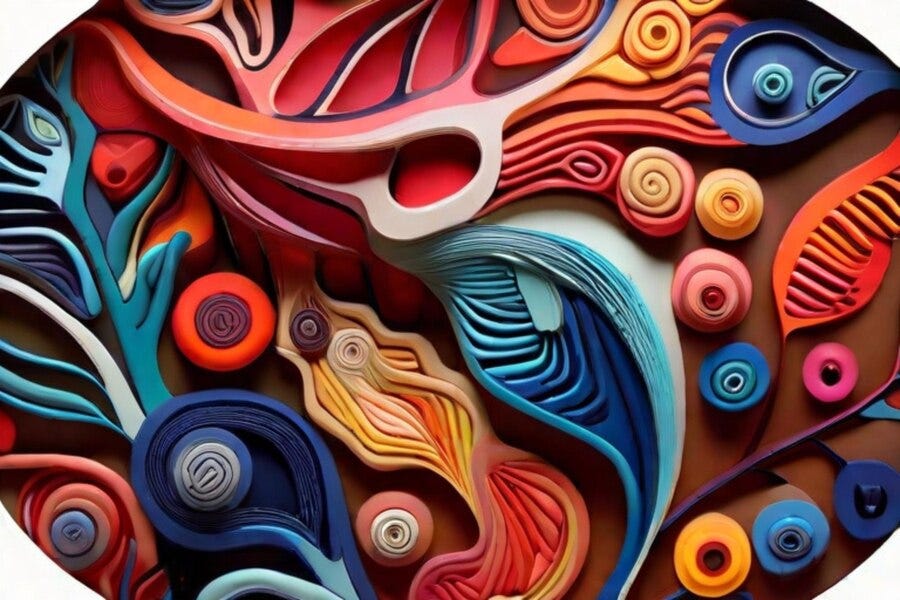I recently came across Arundhati Roy’s talk “The Assault on Meaning.” She gave this talk at the 2024 Kolkata People's Film Festival and, as usual, her clarity of vision and purpose opened new spaces in my own thinking. One of the major themes of her talk is that fascism is compelled to simplify. It must simplify because it cannot exist in the presence of truly complex thought, connection, and feeling. Complexity, nuance, shades of gray, diversity, changeability, adaptability, all are anathema to fascist ways of being, thinking, and action. While they all exist within the range of human experience, fascism – at its core – is about domination and control, regardless of cost.
I began thinking about how this connects to the impacts of trauma on learning, and how unresolved, unintegrated trauma keeps us unsettled and disconnected. It keeps our nervous systems jangled, and our brain structures busy managing an overload of stress-related chemicals. When the chemistry of the brain is off in this way, our ability to even reach our executive functions is weaker. Simultaneously, our tightly clenched nervous system is busy limiting all nonessential functions because isn’t our survival on the line? Whether it is or not, our bodies FEEL like it is, and they respond accordingly.
No one benefits from this near-constate state of stress and unease more than fascist movements. It is in their best interest to keep as many people as possible agitated, fearful, and afraid to trust even themselves.
In this contracted, fearful state, we have less access to the realms of our mind that can think, dream, and imagine a world beyond survival. We are less able to assess and evaluate information, to extend the time between the stimulus and response, to allow ourselves to settle, to trust and connect with others. Our exhausted bodies are caught in spirals of emotional stimuli, reaction, and unintended consequences, lost in a labyrinth of individual and collective wounds. In our efforts to escape, we replicate our own wounding, flinging our pain on others as we search for relief.
This phenomenon is occurring everywhere, all at once, and to say we are unprepared vastly underestimates both what is happening and its consequences.
There is an extraordinary amount of scholarship, journalism, activist and literary writing, and just plain old folk writing, speaking, dancing, making music and art - holding fast in massive resistance against this attempt to overload and exhaust us into submission. But in what I read and hear and see, I find there is little that speaks directly to the experience of teachers and educators, or to the field of education as a whole.
At this moment in time, the world of education, all of it, feels like a chaotic, unsettled, and violent space. Some of this unsettled-ness is a rising awareness that our systems of education are inherently unjust and harmful, with enormous legacies of damage. Some is a widespread attempt to evade that rising awareness, to forbid acknowledging its existence and deny people the right to even discuss its presence and meaning. Some is a burgeoning wave of grief roiling underneath the thin surface of new awareness. Some if it is a deliberate attempt to undermine our belief in the institution of education itself.
Fascist movements target education and teachers because we are the public face of meaning-making, of learning to embrace change and complexity. They attempt to strangle our belief in education itself, causing us to disbelieve in our common dream of shared learning. Keeping educators confused, disorganized, and fighting for their own survival is both a strategy and a tactic, an ends and a means for dominator movements. These movements easily align with education’s weakenesses – competition, exploitation, assimilation, and isolation – co-opting them for ever more destructive ends.
Ultimately, without a shared vision of education and learning in service of life and growth, we are destroying ourselves in service of violence and despair.
Stepping into this moment of educational darkness is like entering a maelstrom; a tentative step into a whirling unknown. Suddenly, we are caught in dizzying loops of rules, policies, demands, laws, requirements, assessments – fielding endless streams of conflicting threats. We quickly realize how sparse and brittle our community and safety nets have become, that we have no sense of when or where we will land. That step is a plunge into faith, taken because some piece of our soul yearns for that shared experience of knowledge and wisdom and meaning-making. Despite the howling torrents, we hold fast to our belief that what we seek is possible, that education can take on other shapes and forms.

Education could be where we learn to cultivate ideas in public spaces, to hold each other with care and accountability, make meaning together, and bring our nervous systems and minds into resonance with each other. We could reshape it as a place where we interrupt historical cycles of harm, integrate traumatic impacts, and invigorate ourselves with renewed purpose. We could re-imagine it as where we learn to love each other in public, guided by teachers who demonstrate care and concern for each other, their students, and our shared world. We can choose ways to share knowledge that affirm our dignity, our worth, and our lives.
As so many of our poets, artists, creatives, mystics, healers, and teachers have shown and taught us, there is no way out but through. We cannot escape these dark days, nor should we. Pain and suffering do not disappear just because we don’t want to look at them, or feel them. Refusing to look, denying our feelings, both are part of the path that brought us here, to this moment of choice.
Do we choose the path of continued brutality, cruelty, and negation? Or do we hold each others’ hands, breathe, and take that plunge into love, learning, and life together?




